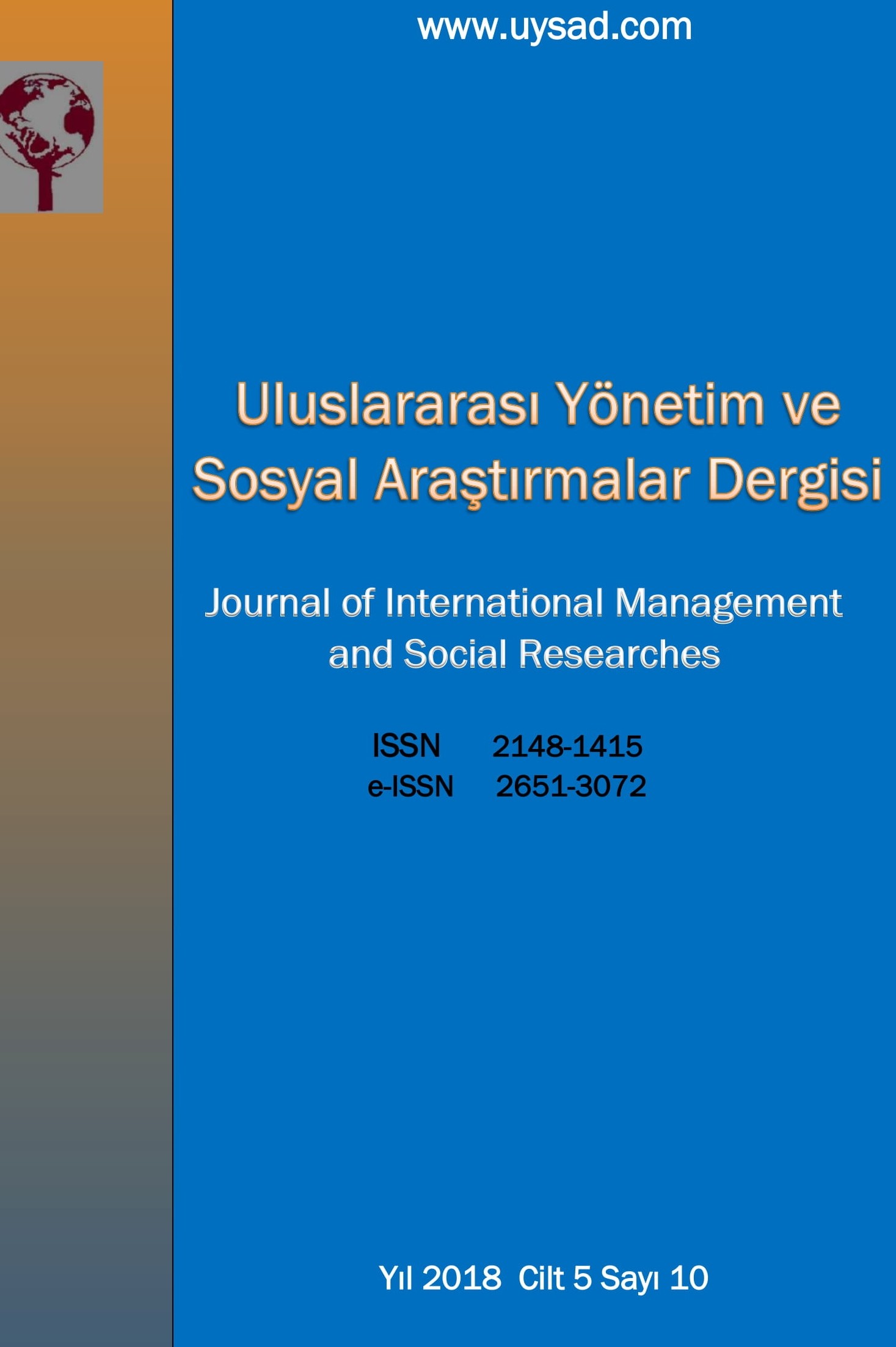Milli Eğitim Bakanlığına Bağlı Okullarda Çalışan Öğretmenlerin Müzakere Algılamaları
“Negotiation” can be expressed as a search for finding a solution to a complicated matter between two parts who are trying to reach an agreement that is acceptable for each. From this aspect, it is possible to express the comprehensive and civilised process of discussions and negotiations occurring during this search as the “negotiation process”.The negotiation perceptions of the teachers who work in the schools of the Ministry of National Education were revealed in this research. For this purpose, the perceptions of the teachers and administrators in the schools about negotiation were investigated. A literature research about the subject was done and the data were gathered by applying questionnaires to 172 teachers and administrators who work in primary schools. The necessary analyses were done to determine the reliability of the indexes used in the research, and the reliability coefficient of the indexes was found as cronbach α: 0, 84. For the analyses of the data, the t-test for the “percent”, “frequency” and “independent samples”, the “one way Anova analysis” and the “regression” analyses were done. The education levels of the individuals who took part in the research were found as fairly higher (85.5 % bachelor’s degree, 14.5 % postgraduate degree), and the average scores of negotiation perceptions were found as relatively fine (3.41) according to the findings of the research. It was also found that the negotiation perception levels don’t show statistically significant difference regarding demographical specifications placed in the questionnaire (p>0.05).
Anahtar Kelimeler:
Müzakere, Devlet okulları, Öğretmen
Negotiation Perceptions of the Teachers Who Work in the Schools of the Ministry of National Education
“Negotiation” can be expressed as a search for finding a solution to a complicated matter between two parts who are trying to reach an agreement that is acceptable for each. From this aspect, it is possible to express the comprehensive and civilised process of discussions and negotiations occurring during this search as the “negotiation process”.The negotiation perceptions of the teachers who work in the schools of the Ministry of National Education were revealed in this research. For this purpose, the perceptions of the teachers and administrators in the schools about negotiation were investigated. A literature research about the subject was done and the data were gathered by applying questionnaires to 172 teachers and administrators who work in primary schools. The necessary analyses were done to determine the reliability of the indexes used in the research, and the reliability coefficient of the indexes was found as cronbach α: 0, 84. For the analyses of the data, the t-test for the “percent”, “frequency” and “independent samples”, the “one way Anova analysis” and the “regression” analyses were done. The education levels of the individuals who took part in the research were found as fairly higher (85.5 % bachelor’s degree, 14.5 % postgraduate degree), and the average scores of negotiation perceptions were found as relatively fine (3.41) according to the findings of the research. It was also found that the negotiation perception levels don’t show statistically significant difference regarding demographical specifications placed in the questionnaire (p>0.05).
___
- Acuff, F. L. (2005). Uluslararası Müzakere: Dünyanın Herhangi Bir Yerinde Herhangi Bir Konuyu Müzakere Etme, (Çev. S. Demirci), 1.Basım, Elma Yayınevi.
- Çakıcı, O. (2003). Kültürler Arası Farklılaşmanın Müzakere Sürecine Etkileri: NATO Ülkeleri Arasında Bir Uygulama Kara Harp Okulu Savunma Bilimleri Enstitüsü Yayımlanmamış Yüksek Lisans Tezi, Ankara.
- Eren:, Kocacık, F. ve Karakuş, H. (2009). Lise öğretmenlerinin iş doyumu düzeyi ile bunu etkileyen bireysel ve kurumsal etkenler: Sivas merkez ilçe örneği, Anadolu Psikiyatri Dergisi 10, 18-25.
- Ertel, D. (2003). Turning Negotiation Into a Corporate Capability. Harvad Business Scholl Publishing Guide to Smart Negotiation. USA.
- Fowler, A. (1997). Müzakere, İkna ve Etkileme, Çev. A. Bora ve O. Cankoçak, 1. Baskı, Ankara: İlkkaynak Kültür ve Sanat Ürünleri Ltd. Şti. Lewicki, R.J., Saunders, D.M. & Minton, J.W. (2001). Essentials of Negotiation, Newyork: McGraw-Hill Irwin.
- Milli Eğitim Bakanlığı, (2013). Milli Eğitim İstatistikleri Örgün Eğitim 2012-1013, Ankara: Türkiye Cumhuriyeti Milli Eğitim Bakanlığı Strateji Geliştirme Dairesi Başkanlığı Resmi İstatistik Programı Yayını.
- Oliver, D. (2001). Etkili Müzakerenin 101 Yolu, Çev. H. T. Dursun, 1.Basım, İstanbul: Alfa Yayınları.
- Özdamar, K. (1999). Paket Programlar ile İstatistiksel Veri Analizi (2.Baskı). Eskişehir: Kaan Kitabevi.
- Sipahi, B., Yurtkoru, E. S. ve Çinko, M. (2006). Sosyal Bilimlerde SPSS’ le Veri Analizi, İstanbul: Beta Yayıncılık.
- Sünbül, D. (2008). Müzakere ve Arabuluculuk Eğitim Programının Ortaöğretim 9. Sınıf Öğrencilerinin Çatışma Çözme Becerileri, Öfke Kontrolü ile Özsaygı Düzeyleri Üzerindeki Etkisinin İncelenmesi, Dokuz Eylül Üniversitesi Eğitim Bilimleri Enstitüsü Yüksek Lisans Tezi, İzmir.
- Tekin, A. S. (2008). Türk Emniyet Teşkilatı’nda Müzakere ve Arabuluculuk, Polis Akademisi Güvenlik Bilimleri Enstitüsü Yüksek Lisans Tezi, Ankara.
- ISSN: 2148-1415
- Başlangıç: 2014
- Yayıncı: Abdurrahim EMHAN
Sayıdaki Diğer Makaleler
Osmanlı’dan Günümüze Sivil Toplum Kuruluşları ve Vatandaşlık Eğitimine Katkıları
Çalışanlarda İş Güvenliği ve İş Kazası Algısı: Mavi Yakalılar Üzerine Bir Araştırma
Serkan BAYRAKTAROĞLU, Mustafa MUSTAFA, Erhan ATAY
Lale Krizinden Günümüze Ekonomik Krizler: Temel Yaklaşımlar ve Ortak Özellikler
Yerel Kalkınma Olgusunun Yaşanabilir Kentler Açısından Değerlendirilmesi
Milli Eğitim Bakanlığına Bağlı Okullarda Çalışan Öğretmenlerin Müzakere Algılamaları
